Most American voters (72%) place a lot of importance on publicly discussing the nation’s historical successes and strengths – with nearly as many (68%) placing a similar level of importance on discussing the country’s flaws.
- Clear majorities of both Trump and Biden voters say both the positive and negative aspects of the nation’s history are important to focus on, although Trump voters are less likely than Biden voters to assign importance to discussions of historical failures and flaws.
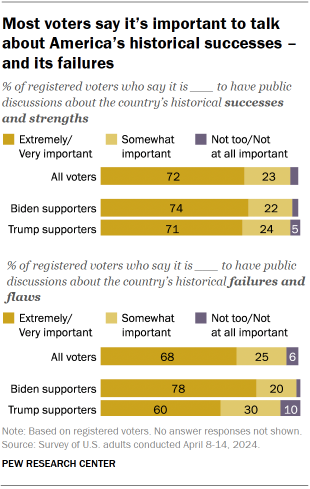
There is also some common ground in how the coalitions view the U.S.: Clear majorities of both Biden and Trump supporters view the U.S. as a great nation.
However, Trump supporters are more likely than Biden supporters to say the nation is singularly great – that it stands above all others, rather than as one of a small number of great nations. And Biden supporters are more likely than Trump supporters (27% vs. 13%) to say there are other countries that are better than the U.S.
Biden and Trump supporters’ views about discussing America’s historical successes, failures
Similar shares of Biden supporters (74%) and Trump supporters (71%) say it is at least very important to have public discussions about America’s historical successes.
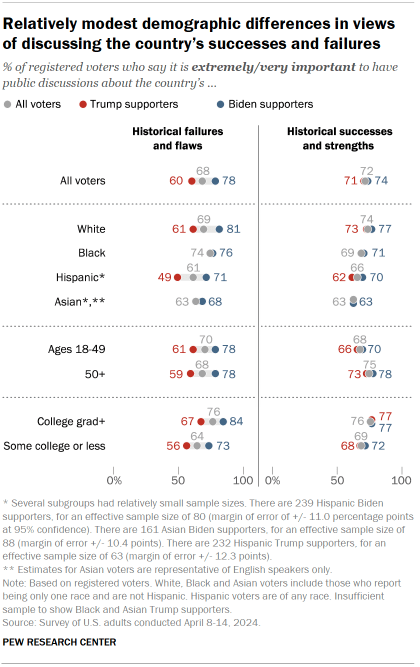
Biden supporters are 18 percentage points more likely than Trump supporters to say it is extremely or very important to have public discussions about historical failures, though majorities in both coalitions say this (78% of Biden supporters, 60% of Trump supporters).
While there are some demographic differences on these questions, majorities of voters across nearly all major subgroups say it is important to discuss both successes and failures.
Race and ethnicity
Among Biden and Trump supporters, White voters are somewhat more likely than voters of other races and ethnicities who support the same candidate to say that discussing both of these topics is important.
Age
Nearly identical shares of voters under 50 (70%) and those 50 and older (68%) say it is at least very important to discuss historical failures and flaws. Older voters are slightly more likely than younger voters to place importance on discussions of historical successes and strengths.
Education
Voters with college degrees are more likely than voters without college degrees to view discussing both types of historical topics as important.
Biden supporters vs. Trump supporters
The shares of Biden and Trump backers who say it is extremely or very important to discuss historical successes and strengths are very similar across demographic groups. Biden supporters are consistently about 20 points more likely than Trump supporters to say it is at least very important to discuss historical failures and flaws.
How does the U.S. compare with other countries?
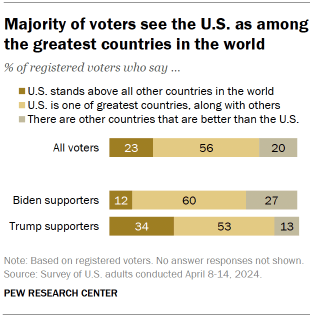
About a quarter of registered voters (23%) say the U.S. stands above all other countries in the world. A majority (56%) say the U.S. is one of the greatest countries in the world, along with some others, while 20% say there are other countries that are better than the U.S.
Majorities of both candidates’ supporters say the U.S. is one of the greatest countries in the world, though Biden supporters are more likely to say this than Trump supporters (60% of Biden supporters vs. 53% of Trump supporters).
- Trump supporters (34%) are about three times as likely as Biden supporters (12%) to say the U.S. stands above all other countries.
- Biden supporters (27%) are about twice as likely as Trump supporters (13%) to say there are other countries that are better than the U.S.
Long-standing age gaps in attitudes about how the U.S. compares with other nations
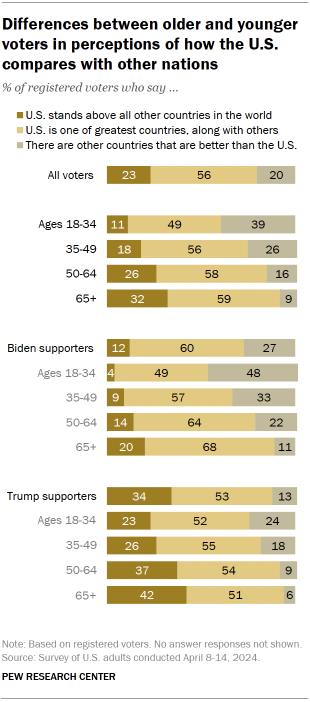
As in prior years, younger voters are far more likely than older voters to say that other countries are better than the U.S. Nearly four-in-ten voters ages 18 to 34 (39%) say this, compared with just 9% of voters 65 and older.
And the oldest group of voters are nearly three times as likely as those under 35 to say the U.S. stands above all other countries in the world (32% of voters 65 and older vs. 11% of those under 35).
Supporters of both candidates differ by age on this question.
- Nearly half of Biden supporters under 35 (48%) say there are other countries that are better than the U.S. Just 11% of Biden supporters 65 and older say this. And while 20% of Biden supporters 65 and older say the U.S. stands above all other countries, just 4% of those under 35 say this.
- Trump supporters under 35 are also more likely than those 65 and older to say there are other countries that are better than the U.S. And they are less likely to say the U.S. stands above all other countries in the world.
Views of how the U.S. compares with other countries have not shifted in recent years
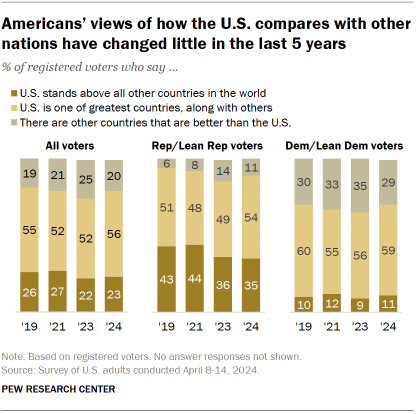
For the most part, American voters’ views of how the country stacks up against other nations have been relatively unchanged over the last five years.
Today, 20% of voters say that other countries are better than the U.S., down from the 25% who said this last year, but nearly identical to the share of voters who said this in 2021 and 2019.
The share of voters saying the U.S. stands above all other countries in the world – 23% – remains slightly lower than the share saying this in 2021 (27%) but is nearly identical to the share who said this last year.




